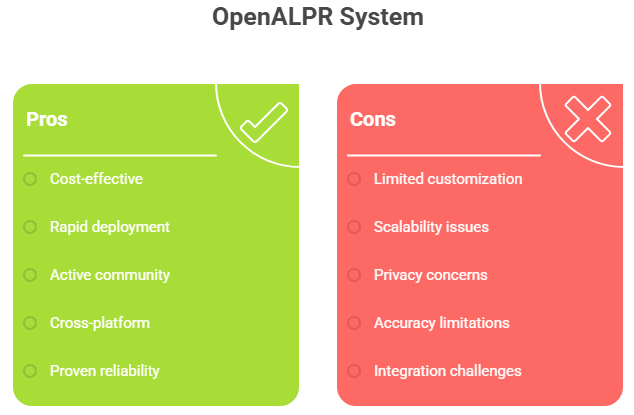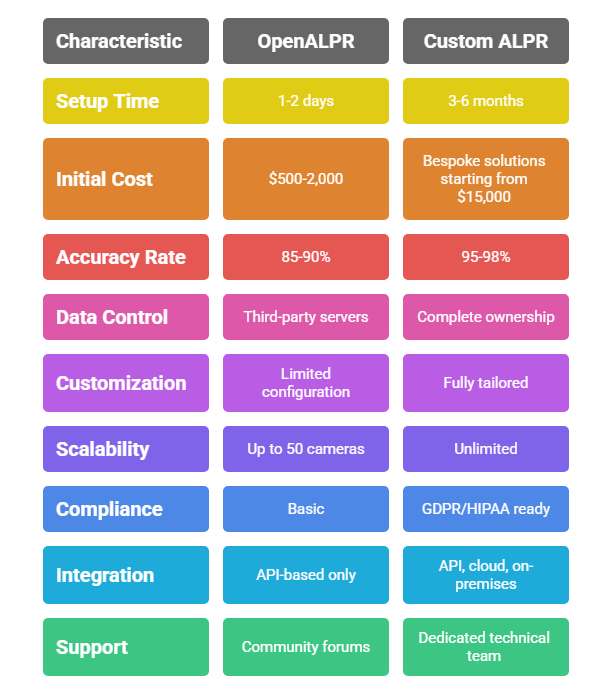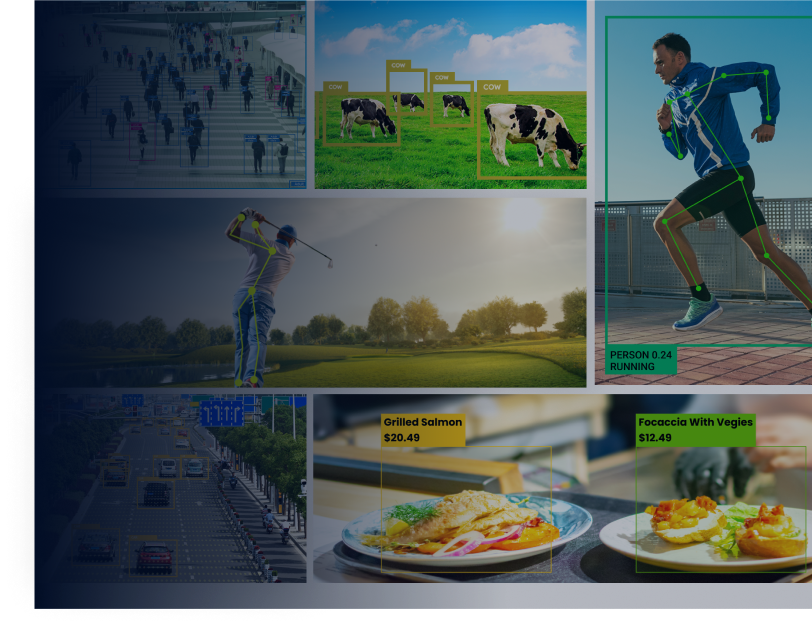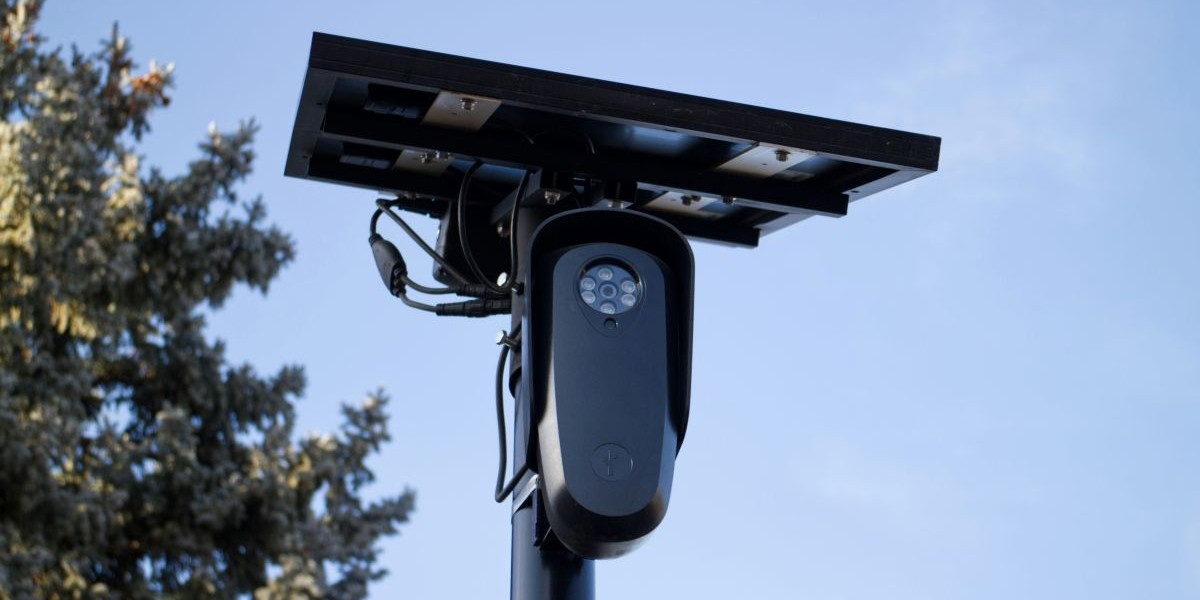Choosing between OpenALPR vs custom ALPR solutions has become one of the most critical technology decisions for businesses implementing vehicle recognition systems. However, not all license plate recognition software providers deliver the same results.
The choice matters because ALPR accuracy directly impacts your operations. If the system misreads license plates, the wrong vehicles get billed, authorized users face access denials, and security protocols fail. These errors cost money and damage customer relationships.
At Folio3, we offer custom ALPR solutions built with advanced AI and deep learning algorithms that seamlessly integrate with your existing cameras, traffic management systems, and access control software, whether on-premise or in the cloud.
This ALPR software comparison examines pricing, accuracy rates, scalability limitations, and compliance requirements. You’ll understand exactly when OpenALPR works effectively and when custom development becomes essential for your operational success.
What is OpenALPR?
OpenALPR is an open-source automatic license plate recognition system that provides pre-built algorithms for vehicle identification.
Toward the end of 2015, OpenALPR’s Matt Hill and his co-founder created an automatic license plate recognition library written in C++ and gave it away for free, for a time. Developed initially to democratize ALPR technology, it offers ready-to-deploy solutions with minimal configuration requirements.
The platform processes license plate images through cloud-based or on-premise processing, supports multiple operating systems, and provides APIs for basic integration needs.
Advantages of OpenALPR

OpenALPR delivers immediate deployment benefits that appeal to organizations seeking rapid implementation without extensive technical resources:
- Cost-effective entry point: Free open-source version available with commercial cloud services starting at reasonable monthly rates
- Rapid deployment timeline: Complete setup achievable within hours using pre-built APIs and comprehensive documentation packages.
- Active community ecosystem: Large developer community provides ongoing support, troubleshooting assistance, and regular feature updates.
- Cross-platform compatibility: Consistent performance across Windows, Linux, and mobile platforms without additional configuration requirements.
- Proven market validation: Thousands of successful implementations across diverse industries demonstrate reliable core functionality.
Disadvantages of OpenALPR
However, standardized solutions impose considerable operational limitations that may compromise long-term business objectives and performance requirements:
- Restricted customization capabilities – Core recognition algorithms cannot be modified to address specific environmental challenges or regional variations.
- Performance scalability constraints – System efficiency degrades when processing multiple high-resolution ALPR camera feeds simultaneously under load.
- Data privacy and security concerns – Cloud-based processing requires sensitive license plate information to traverse third-party servers.
- Generic accuracy limitations – Standard training datasets may not perform optimally in unique lighting conditions or specialized plate formats.
- Complex enterprise integration requirements – Connecting with existing business systems often demands extensive middleware solutions and custom workarounds.
What are custom ALPR solutions?
Custom ALPR development involves building license plate recognition systems specifically tailored to organizational requirements, environmental conditions, and integration needs. These solutions address unique challenges such as processing plates in extreme weather, handling specialized vehicle types, or integrating with complex infrastructure.
Applications span private parking management, smart city implementations, gated community access control, and enterprise fleet logistics operations. At Folio3, our license plate recognition technology delivers fast, accurate results day or night, supporting diverse applications from toll management and parking enforcement to law enforcement and smart city initiatives.
Benefits of custom ALPR solutions
Purpose-built development delivers measurable operational advantages that directly impact business efficiency and competitive positioning in the marketplace:
- Superior recognition accuracy: Machine learning models trained on specific environmental conditions and regional plate variations consistently achieve 95-98% accuracy.
- Flexible deployment architectures: Edge computing, cloud, or hybrid implementations designed to match existing infrastructure requirements and latency specifications.
- Native enterprise integrations: Seamless connections to ERP platforms, access control systems, parking management software, and surveillance networks without middleware complexity.
- Complete regulatory compliance: Built-in GDPR, HIPAA, and industry-specific data processing, retention, and audit capabilities that ensure legal compliance.
- Unlimited scalability potential: System architecture designed to handle growth from dozens to thousands of ALPR cameras without performance degradation.
Challenges of custom development
Custom implementation requires strategic planning and resource allocation that organizations must carefully evaluate against long-term operational benefits:
- Extended development timelines – Comprehensive projects typically require 3-6 months from initial requirements gathering to full production deployment.
- Massive upfront investment – Development costs range from $50,000 to $500,000, depending on system complexity, scale, and integration requirements.
- Ongoing technical maintenance – Regular system updates, model retraining, and performance optimization require dedicated technical expertise and resources.
OpenALPR vs custom ALPR: feature comparison

Which one is right for you? Use case scenarios
The optimal choice depends on your specific operational requirements, scale, and long-term objectives rather than initial cost considerations alone.
You should choose OpenALPR if:
- You’re a small business looking for fast setup: Retail establishments, small parking facilities, and basic security applications need immediate deployment without extensive technical configuration or specialized expertise requirements.
- Budget constraints limit initial investment: Organizations with tight capital budgets benefit from OpenALPR’s free open-source version and predictable monthly cloud service costs for basic implementations.
- Use cases remain generic and standardized: Basic security monitoring, simple parking lot management, and standard access control applications work effectively with pre-built algorithms and standard configurations.
You should go with a custom ALPR if:
- Scalability and enterprise system integration are essential: Large facilities processing thousands of vehicles daily require native connections to ERP platforms, access control systems, and business intelligence tools for operational efficiency.
- Accuracy and real-time insights drive business success: Mission-critical applications like toll collection, law enforcement, and high-security facilities need 95%+ accuracy rates with sub-second processing capabilities for immediate decision-making.
- Multi-regional operations with diverse plate formats: International organizations processing vehicles across different countries need specialized algorithms trained for regional plate variations, local regulatory compliance, and cultural considerations.
Our team loves solving complex logistics challenges. See how our AI in Transportation and Logistics solutions are helping companies like yours every day.
Security, data ownership & compliance: the hidden cost
Understanding data flow and compliance implications reveals primary long-term considerations often overlooked during initial evaluations and vendor selection processes.
OpenALPR: data hosted on Third-Party Systems
OpenALPR’s cloud-based processing model introduces inherent privacy risks as license plate data travels through third-party servers for analysis. This architecture creates potential compliance gaps for organizations handling sensitive vehicle information.
Data residency requirements, audit trails, and user consent mechanisms may not align with enterprise security policies or regulatory mandates like GDPR, CCPA, or industry-specific requirements. The lack of control over data processing locations, retention policies, and access logs can expose organizations to regulatory violations and security breaches.
Custom: full control of PII, GDPR/HIPAA compliance
Custom solutions provide complete control over data processing, storage, and retention policies, enabling organizations to maintain data sovereignty and meet strict compliance requirements. On-premise processing eliminates third-party data exposure while enabling comprehensive audit trails and user consent management.
This approach proves essential for organizations requiring GDPR Article 25 compliance, HIPAA data protection, or government security clearance protocols. Full data ownership ensures compliance with evolving privacy regulations and enables specific retention schedules and access controls.
Folio3’s expertise in secure AI systems ensures ALPR implementations meet the highest security standards through encrypted data transmission, secure model hosting, and comprehensive access controls. Our compliance framework addresses GDPR, HIPAA, SOC 2, and government security requirements while maintaining optimal performance.
Total cost of ownership (TCO)
Accurate cost analysis requires examining both immediate expenses and long-term operational implications across multi-year deployments and scaling requirements.
Long-term cost of OpenALPR vs. custom
OpenALPR’s per-camera licensing, cloud processing fees, and limited customization options often result in higher total costs for medium to large deployments. Hidden expenses include API call charges, storage fees, bandwidth costs, and premium support subscriptions that accumulate over time.
Feature limitations may require additional third-party integrations and ongoing maintenance contracts. Custom solutions typically achieve break-even within 18-24 months while providing superior functionality, dedicated support, and predictable scaling costs without vendor lock-in or recurring license fees.
ROI of systems built for your needs
With custom implementations, government agencies, logistics companies, and intelligent parking systems frequently realize 40-60% cost savings over five years. These organizations benefit from operational efficiency improvements, reduced manual interventions, enhanced accuracy rates, and seamless integration capabilities that directly impact revenue generation.
Custom ALPR systems deliver measurable ROI through automated processes, reduced staffing requirements, improved customer satisfaction, and enhanced security capabilities that justify the initial development investment through sustained operational benefits.
Why choose Folio3 for custom ALPR solutions
Folio3’s deep expertise in computer vision and enterprise AI delivers measurable results across diverse ALPR applications and challenging deployment environments.
Folio3’s ALPR expertise
- Proven computer vision track record: Successfully delivered 50+ computer vision projects, including large-scale ALPR deployments for government agencies, logistics companies, and smart city initiatives with measurable ROI improvements.
- Advanced edge AI optimization: Specialized expertise in optimizing machine learning models for edge computing environments, ensuring real-time processing capabilities while maintaining strict security and privacy requirements.
- Enterprise integration mastery: Deep experience connecting ALPR systems with existing infrastructur,e including ERP platforms, access control systems, surveillance networks, and business intelligence tools for seamless operations.
- Comprehensive compliance framework:– Extensive knowledge of GDPR, HIPAA, SOC 2, and industry-specific regulations ensures compliant implementations with built-in privacy protection and audit capabilities.
- Dedicated lifecycle support: Committed technical teams provide proactive monitoring, model updates, performance optimization, and ongoing maintenance throughout the entire system lifecycle for sustained performance.
Frequently asked questions
What’s the difference between OpenALPR and custom solutions?
OpenALPR provides standardized license plate recognition through pre-built algorithms and cloud processing, while custom solutions are specifically designed for your operational requirements. Custom solutions typically deliver higher accuracy rates, better scalability, and complete data control compared to OpenALPR’s generic approach.
Can I customize OpenALPR?
No. OpenALPR offers limited customization options primarily through configuration settings and API parameters. However, core algorithm modifications, training data adjustments, and deep integration capabilities require access to source code and specialized expertise that may not be practical for most organizations.
How long does it take to build a custom ALPR system?
Custom ALPR development typically requires 3-6 months from initial requirements gathering to full deployment. This timeline includes system architecture design, model training with your specific data, integration development, testing phases, and deployment across your infrastructure.
Can ALPR integrate with parking or ERP systems?
Yes. Both OpenALPR and custom solutions can integrate with existing systems, though their capabilities differ significantly. OpenALPR requires API-based connections that may need middleware, while custom solutions include native integrations explicitly designed for your software ecosystem, providing seamless data flow and reduced maintenance overhead.
Is it legal to use OpenALPR data?
OpenALPR data usage is typically allowed for educational, research, and personal projects, as long as users follow the software’s licensing terms and applicable privacy laws. Commercial applications or sharing OpenALPR’s data with third parties often require authorization from the original copyright owners or data sources.
Final words
The choice between OpenALPR vs custom ALPR solutions ultimately determines whether you adapt your operations to software limitations or leverage technology that amplifies your competitive advantages. While OpenALPR serves immediate needs for basic applications, custom solutions transform ALPR from a simple recognition tool into a strategic infrastructure that scales with your growth.
Organizations serious about vehicle intelligence should evaluate their long-term objectives, compliance requirements, and integration needs before committing to platforms that may constrain future expansion and operational excellence.
Ready to build a secure, smart ALPR system that works exactly the way your business needs it to? Consult with our Experts.

Laraib Malik is a passionate content writer specializing in AI, machine learning, and technology sectors. She creates authoritative, entity-based content for various websites, helping businesses develop E-E-A-T compliant materials with AEO and GEO optimization that meet industry standards and achieve maximum visibility across traditional and AI-powered search platforms.









